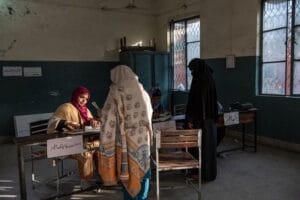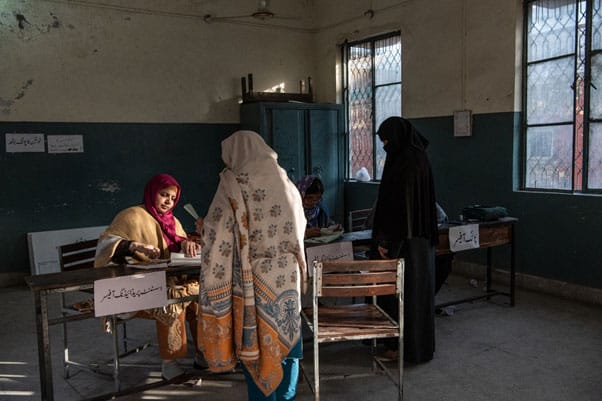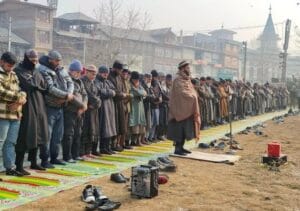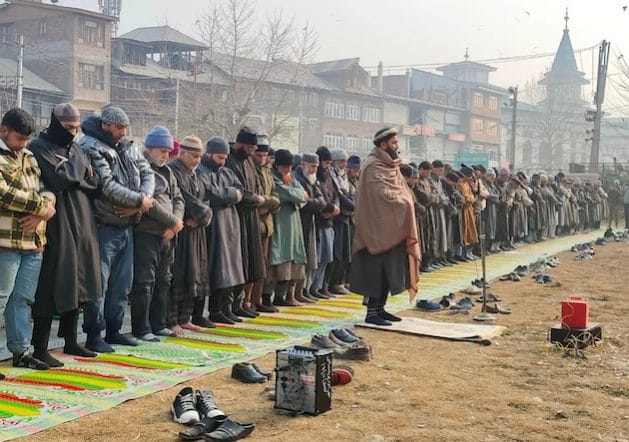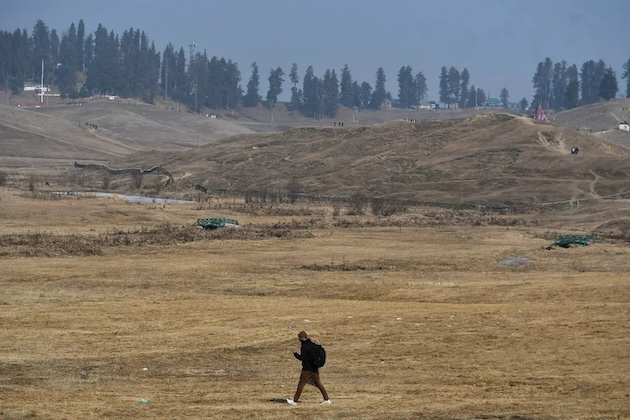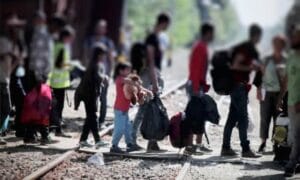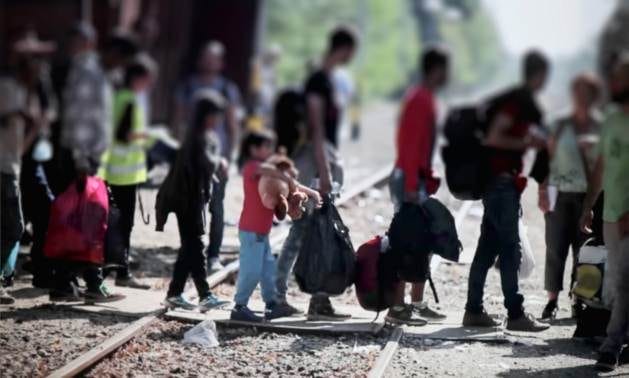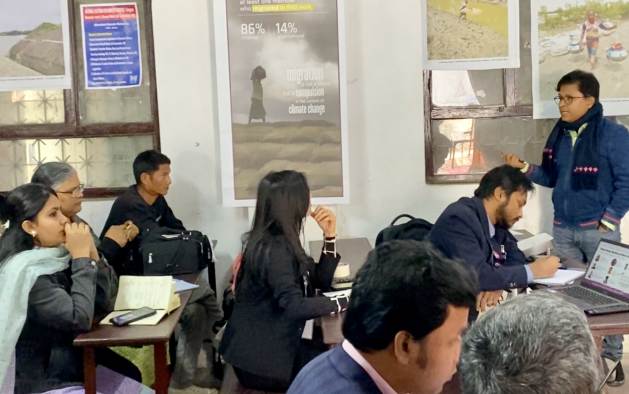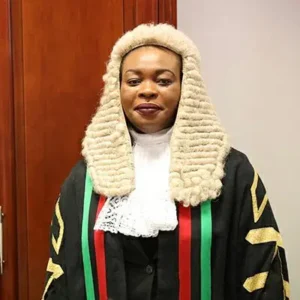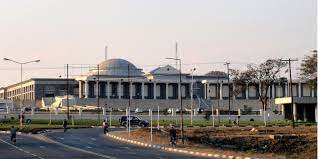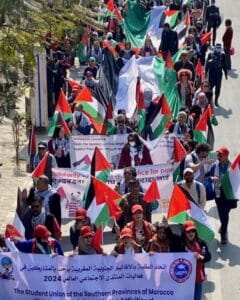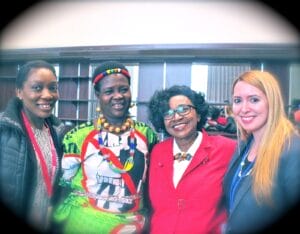

By Janet Karim
Dream like Martin, Reclaim like Maxine, Think like Garvey, Fight like Malcolm, Challenge like Rosa, Speak like Fredrick, Write like Maya, Build like Madam C.J., Educate like W.E.B., Lead like Harriet, and Inspire like Obama. – Black History Month commemoration plaque of just a few of African American heroes, 2024
Opinionate like Janet Z. Karim by giving opinions that are laced with solutions! – Janet Zeenat Karim, 2024
The ngoma drums and nsindo dancers are still resounding with great joy this week Kumangoni lands in Malawi and in the diaspora: Chief Theresa Kachindamoto was this past week awarded two honorary PhD degrees by two Belgium universities. As Chief of Dedza district, she has authority over more than 900,000 people. She is known for her forceful action in dissolving child marriages and insisting on education for both girls and boys, footing the tuition bills of those who cannot afford the cost of tuition at secondary level.
According to Nation Online, the two Belgium universities, Katholieke Universiteit Leuven (Catholic University in Belgium) and Université Catholique (UC) de Louvain have accorded Chief Kachindamoto of Dedza the joint honorary degrees for her work that champions women’s and children’s rights in her area. At the onset of her rise to her campaign, the media often referred to her as the Child Marriage Terminator, Malawians may now call her Chief Dr. Theresa Kachindamoto.
I first met Chief Dr. Kachindamoto when she was part of the entourage of former Gender Minister Patricia Kaliati at the 2015 United Nations Commission on the Status of Women. Malawi Parliament had earlier in 2015 passed into law the raising of the age of marriage to 18 years, being the first country to legally outlaw child marriage in Malawi. She spoke eloquently relating her work in her area of authority that includes Dedza, how by that time she had terminated over 300 marriages involving children (girls and boys). She also told the stunned delegations from 194 countries how after terminating the marriage, she found herself paying for school fees (especially for the girls) of the former married students.
Among the pictures Dr. Kachindamoto painted was that of young girls either being taken out of school by parents who cannot afford to pay for school fees, or young girls being married off to pay a debt owed by the family. As a member of the audience, it was exciting to listen to the Chief speak so passionately about issues that the UN SADC (Southern African Development Community) group had painstakingly outlined in our Resolution calling for the end to the global scourge of child, early, and forced child marriage. As a member state of SADC, the Malawi Mission to the UN, joined fellow delegates advocating for an end to the practice of child, early, and forced marriage that was noted to be a global menace that impinges on the human rights of young girls and boys.
The times were great moments to work at the UN as a Malawian; in 2012 Malawi had its first female President, dr. Joyce Banda. As she elaborated and underscored the village-level campaign to have all pregnant women have their babies delivered at health centers or hospitals, Chief Kachindamoto’s work on terminating marriages coupled with the promise of school fees. Thus in my Malawi, while chiefs were insisting on “no pregnant women will deliver their babies in my village,” Dr. Kachindamoto was decreeing “There shall be no child marriage in my district.”
The brass and brave decree morphed fast into a By-Law; the actions of the Child Marriage Terminator was applauded for the noble, laudable, and refreshing game-changing actions for the benefits got national and later global attention. Her exposure at the UN the 2015 CSW led to invitations to be guest speaker at UNICEF, UNFPA, and UNICEF; all three benefit from the cross-cutting nature of banning child, early, and forced marriage.
It has been close to 10 years since Chief Kachindamoto’s debut at the UN. When I had the opportunity to talk with her in the corridors of the United Nations, it was an awesome feast to witness the Chief rise to the level of global recognition and the honorary degree accolade. As I sing and dance like an avid fan on steroids, I wonder what were all the two honorary degrees from UNIMA and MZUNI to the former first ladies in the previous administrations, all about? Comparatively-speaking, were their achievements of grander substances as Chief Dr. Kachindamoto?
Do honorary degrees have to be awarded to our local heroes from foreign and distant countries? UNIMA, MZUNI, MUBAS, and the Lilongwe Uni, where are your honorary degrees for local heroes? Malawi has truckloads of heroes (past and present). Regrettably, Malawians – the educated and not, eloquent, and not so eloquent, should they be waiting to be called to another country to be awarded the coveted honorary? Or does it mean the foreign and distant universities are beating unnecessary drums or drums without a cause for our honorary degree recipients? Many of these questions are water under the bridge; but very suspicious murky waters.
The answer is that maybe Malawians just do not care about its heroes: it has a truckload of heroes, both past and present. Regrettably to the credit of the educated and not, the eloquent and not, the political and not, all that would rather criticize, find fault, go past the light of some local person’s thunder, arrive and get immersed into Critique Zone. The opportunity to appreciate, elevate, and enjoy the success of a fellow Malawian evaporates ever so fast. This must stop.
A very big case in point is the story of William Kamkwamba, who in my opinion, deserves one from three main constituent colleges of UNIMA.) Kamkwamba is an inventor, engineer, and author. Before he graduated from secondary school, he built a wind turbine to power multiple electrical appliances in his parent’s house in Kasungu. He used blue gum trees, discarded bicycle parts, and materials collected in a local scrapyard. The lad was whisked away to SA where he attended British system secondary school then air-lifted to the US where he graduated from Dartmouth College. He has since built a solar-powered water pump, which supplies drinking water to his village. He has been a guest speaker to the renowned TED talk shows. And the book recounting his amazing story, The Boy Who Harnessed the Wind, was turned into a film.
The country has someone from its soil who builds solar -powered water pumps and yet we are still yapping about load shedding and power blackouts?! The Kamkwamba story pains me because of Malawi’s reluctance to embrace and celebrate its heroes. This is a call out to the UNIMA colleges (past and present, please excuse me that I do not agree with the breakup of the original UNIMA), these must scrape up on their research prowess and find all the brilliant Malawi minds that did, have done, or are doing great things, worthy of the honorary degree.
Here is my short list of heroes that must be awarded honorary degrees:
1. Former Official Hostess, Mama C. Tamanda Kadzamira (dedication to service in transition to democracy).
2. Bakili Muluzi (successfully steering Malawians to life after Kamuzu Banda, former first, and Life President of Malawi).
3. ConCourt Justices (delivering brilliant verdict on the 2019 flawed presidential elections.
4. Dr. Joyce Banda (showing Malawians and the world “Yes, she can!”).
5. Former first female Chief Justice Anastasia Msosa (worked brilliantly in one party and multi-party environments with great aplomb).
6. Justice Andrew Nyirenda (for integrity and ensuring the rule of law and respect to our constitution prevail).
7. Gregory Gondwe (for the tenacity to unveil the truth behind the news.
By the way, all Malawians, systems, and institutions should keep very keen eyes on our Chief Dr. Kachindamoto. She is fighting child marriage and promoting the welfare of women’s rights and empowerment; let us help her in her campaign that there is integrity of school curriculums in our schools. Since Belgium is part of the EU, (an organization that has blackmailed African countries and others – ACP-EU NPA – to sign a document with values that are not our values. Under the banner of human rights, the EU aims to get Malawi and other African countries to change the laws governing pregnancy, contraceptives, right to abortion and the rights of same-sex couples. Malawi should not allow such deceptive agendas to slip into the Chief’s campaign.
UNIMA, please start giving out the degrees to numerous Malawian heroes and sheroes. All quiet on this front is no longer an option: start dishing out them honorary degrees! Kamkwamba should get at least three.
Caption: In the picture below: Chief Dr. Theresa Kachindamoto, in March 2015 when she visited the UN to talk about ending child marriage in her constituency. Seen here with the Malawi Mission to UN diplomats and staff. – Photo by Robert Michael

